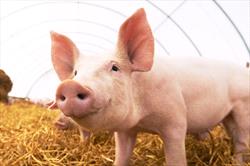Bob Judd, DVM, DABVP (Equine Medicine), DABVP (Canine and Feline Practice)
Piglet in straw

A research team at Texas A&M University is studying methods to use the amino acids arginine and creatine to boost pig birth weight. Dr. Fuller Bazer Ph.D., says he believes supplementing diets with arginine and creatine can increase the growth and development of the swine embryo and fetus during gestation.
Arginine has been considered a non-essential amino acid in pigs because it is produced in the pig’s body. However, the research team found that the amount of arginine produced is insufficient in certain conditions like pregnancy. Consequently, they believe arginine needs to be supplemented as it enhances embryonic and fetal growth and survival.
Arginine is converted to nitric oxide, which stimulates blood vessel growth and promotes the dilation of blood vessels, allowing more blood and increased nutrients to the uterus. Increased blood flow to the reproductive tract supports fetal and placental growth and development throughout pregnancy.
Arginine also gives rise to creatine which the researchers believe can help overcome the birth of runt piglets and improve neurological function in piglets. Creatine promotes skeletal muscle development so that the piglets will be stronger.
It is believed that 10% of piglets die when the mother lies down on them because the piglets are not alert enough to get out of the way. The researchers are trying to figure out if creatine does influence the amount and type of skeletal muscle in pigs and whether supplementing the sows’ feed increases the weight and muscle mass of the piglets which is important for their survival.
Once the information is worked out in animals, it is possible it could be helpful when small-for-date babies occur in human pregnancies. This research could decrease the number of human babies that require the use of an incubator to survive.